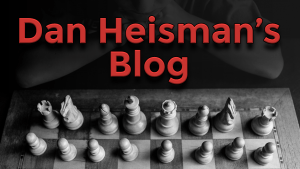The Michael de la Maza Story
It's not the entire story - it's just what I know from talking to Michael on the phone, a series of email exchanges over a year+ period, and following the saga on the internet. As you will discover near the end, I only met Michael in person once...
Back around the turn of the century (that sounds funny!), Michael wrote a very popular article for Chess Horizons, the long-time Massachusetts State Federation chess magazine. Around the same time, I had my first few articles published by the new online chess magazine, Chess Cafe; the popularity of these articles would soon lead to my ongoing column Novice Nook, but that's a different story.
My online articles caught Michael's eye and he contacted me. He let me know about his article and asked if I could put him in touch with Chess Cafe, since he thought a wider readership might benefit from his article. I did, and the benefits turned out to be mutual; Michael's article 400 Points in 400 Days (parts 1 and 2) went viral. It was by far the most downloaded article that Chess Cafe had published up to that point.
Here's a quick summary of what had happened to Michael that led him to write his article: Michael was an MIT graduate who was starting to take up chess seriously as an adult, but was stuck at about the 1400 level. Like many adults, he assumed that he needed to augment his natural skills and intelligence by compiling chess knowledge: he studied openings, endgames, and other "chess knowledge" information. Despite all that accumulation of knowledge, he was getting nowhere. At one point a stronger class player told Michael he had the answer: pick up the fantastic chess book How to Reassess Your Chess by IM Jeremy Silman and that will break the ice.
So Michael purchased HTRYC and read it - it was a revelation: it contained a wealth of information that Michael did not know. This must be the gold mine! Michael studied the book intently and went to his next tournament eager to put his newfound powers to the test. In his recollection he got a position where he thought for half an hour about how to get a good knight against a bad bishop and then - promptly lost his knight! (This is a good illustration that advanced chess knowledge might be new and perfectly understandable to intelligent adults, but that doesn't mean following it is what you need to become a better player! See my articles Chess Books and Prerequisites and When Adults Learn Basic Material).
So it turned out HTRYC was not the panacea that Michael had hoped. But what was? So, in desperation, Michael turned to some other fundamental (and common sense) advice about learning tactics really well, and augmenting other analytical skills. For example, he developed and performed a series of very intense "board vision" puzzles to improve his ability to quickly and accurately determine what was happening on a chess board. While not giving up tournament play, Michael did, for a short time, essentially "lock himself in a closet" and intensely work on some specialized basics.
This time it worked! By increasing his board vision and tactical vision, and incorporating some other common sense issues like using his time wisely and not making the same mistakes twice in the opening, notable progress was finally achieved. Unlike his original attempt of just increasing his chess "knowledge", which had failed badly, Michael now gained 400 points in 400 days, and wrote the article about his experience.
Once the article became popular, the question arose about expanding it into book form. If I remember correctly, I believe I had advised Michael to approach the big chess publishers, like Everyman and Gambit. In any case, eventually Michael received a contract with Everyman and created Rapid Chess Improvement.
I often get asked if I agree with everything in Rapid Chess Improvement and the answer is clearly "No". However, I do agree with most of it - see my article An Improvement Plan or, better, the much newer version of that article updated for my book A Guide to Chess Improvement.
One of the areas where I don't agree is Michael's use of The Seven Circles with the entire CT-ART 3.0. Once I read the literature on how the Soviets trained for tactics, I realized the correlation that training had with learning multiplication tables: you drill 6x7 = 42 extensively to recognize it, but you don't drill 473 x 57,642 =?; you learn how to do it. Similarly (but not perfectly analogous), in chess I believe you should drill the ~2,000 basic tactics for recognition but only "solve" more advanced problems once. For more on this important topic, check out my articles Tactical Sets and Goals and The Most Common and Important Use of Tactics.
Back to Michael...with the publication of his book, Michael became a well-known but controversial figure. Some viewed him like a pioneer but many, including some strong players who reviewed his book, took a decidedly negative stance.
At the 2001 World Open here in Philadelphia, I was checking out how members of the Main Line Chess Club and my students were doing going into the 8th and penultimate round. While perusing the pairings, I stumbled across the fact that Michael was not just in attendance, but in contention for first in the U2000 section. Never having met him in person, I quickly searched out his table to get in a "hi" before the round started. Michael was at the board, but his opponent had not arrived yet. I introduced myself (Michael knew me fairly well by then, but not personally - that happens in the internet age) but Michael quickly said,
"Hi Dan! I'd like to chat but I am getting ready to play a game for $10,000. So, if you don't mind, I'd prefer not to talk just now!" I respectfully honored his wishes and quickly retreated.
Michael won the section with an 8-1 score and, in doing so, his rating passed the USCF Expert barrier by rising from 1962 to 2041.
After the event I contacted Michael to congratulate him and ask what he was planning to do for an encore. His answer surprised me:
"Dan, I think I have shown that what I wrote can work. I have become a fairly strong player by following the methods explained in my book. But I think that's as far as those basic things can take me. To get to the next level, I would have to really learn how to play chess - advanced strategy and the like - that's something that would take some real work, and I don't think I want to do it. So I'm going to retire from chess!"
Michael was a man of his word and, so far, he's never played competitively again. Nor have I been in contact with him. But his small legacy in the chess world, no matter what you may think of it, has been established. In my opinion, many players in the same predicament as Michael could do a lot worse than following most, if not all, of his suggestions. Some have tried, with varying results; you can Google them using key phrases like "Rapid Chess Improvement" or "The Seven Circles" and read about their experiences.
(Further reading: My Top Tips for Chess Improvement and Improving Requires Extensive Practice Looking for Better Moves.)

